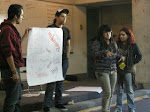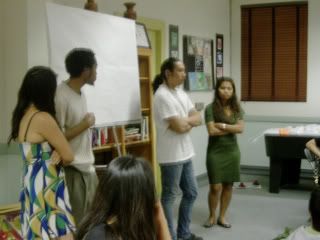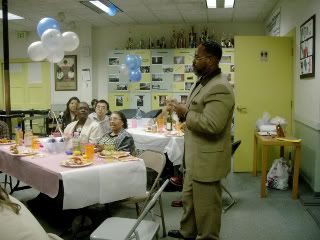Monday, we went on a neighborhood crawl in San Francisco Chinatown. Our crawl leader was Rev. Norman Fong, a Chinatown native, pastor, and housing rights activist from Chinatown Community Development Corporation. Norman talked about the oppression and the perseverant community organizing that has taken place in the Chinatown over the last 50 years in the midst of racism and gentrification from the surrounding financial district.

After walking through the streets and alleys with Norman and eating a filling lunch at a local Chinese restaurant, we went to the Presbyterian Church in Chinatown, the oldest Asian American church in the United States. There, we did some talkstory with Joshua Chuck, Associate Director of Youth Ministries at Donaldina Cameron House, and R2W Program Associate Lauren Quock. Josh and Lauren represent the next generation of faith leaders who grew up in Chinatown. Josh emphasized the challenges that new immigrants face in everyday life, including being in a new place, being poor, not knowing how to speak the language, and not having a place to live or much family support. Lauren traced the culture of shame and silence in the Chinese American community back to the Chinese Exclusion Act and the fact that many Chinese came as "paper sons and daughters" with false papers.
Participants then practiced their problem posing skills by reflecting on, "Why? Why are things this way?" and proposing theories of political, economic, social, spiritual, and historical roots of the problems in Chinatown. Fela offered the theory, "If a person is disadvantaged in one way (political, social, economic, historical, spiritual), as immigrants in Chinatown are, then there is a snowball effect and they are disadvantaged in other ways as well."
A number of participants related to the oppression, Chinese culture and community hub, and community organizing they witnessed in Chinatown:
Kim, who is middle class, 3rd/4th generation Chinese American from Alameda, said, "I used to just come to Chinatown for family banquets and I used to not really like coming to Chinatown. But today, I saw a different side and came to appreciate it differently."
Nina, a Filipina from Los Angeles, said, "My community in Echo Park, Los Angeles is being gentrified, too."
Jimmy, who is Chinese and Cambodian from Oakland, said, "I understand why my house was foreclosed on now."
Clinton, who is Kenyan from Seattle, WA, said, "After hearing about the activism in Chinatown, I know that if a community can come together and get organized, it can really have an effect and make things happen."
When we go on Neighborhood Crawls, we try to remember that we are walking on sacred ground. To honor the stories, the struggles, and the history that we heard, we finished the neighborhood crawl by setting up an altar at the base of a tree in Portsmouth Square and offering fruits to those who came before us and those who live in Chinatown now.
Monday, June 22, 2009
R2W 2009, Day 3 - Sardine Theology in Chinatown, San Francisco
by Lauren Q.
Subscribe to:
Post Comments (Atom)








No comments:
Post a Comment